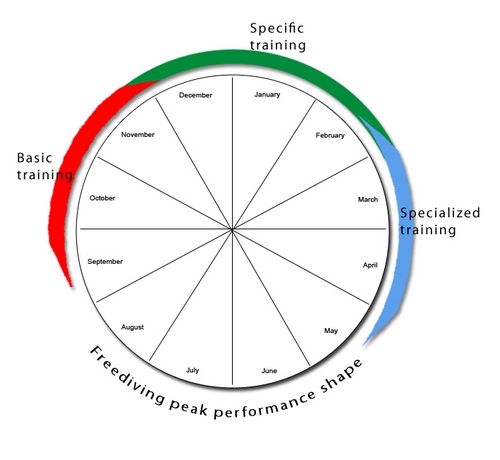 |
 |
Article by: Annelie Pompe
Personal Trainer, freedive instructor and silvermedalist i freediving world championship
How to get in perfect freediving shape - the secret of progressive training
Freediving is just as much a sport as it is recreation and having a wonderful experience. As in all sports, you have to train to get better. The better trained you are - the more you will enjoy freediving. Having a fit body will help you in many ways. Also, being in good shape and feeling strong and healthy is the best confidence you can have, no matter if you’re a deep, -pool or recreational freediver.
| The best way to become a better freediver is of course to train freediving. As a beginner, the more time you spend in the water the better you will become. But eventually you will reach a plateau, where one of several things can stop you from getting further; equalising problems, lung squeeze problems, oxygen problems, mental problems or simply not having enough of a fit body. Many of theese things can be trained out of the water during the freediving off-season. |
 |
Freediving is a complex activity. It combines many types of muscular and energy systems, as well as integrating the body-mind connection, so your training should include all of these. The big tricky part is WHEN and HOW to train WHAT.
Freediving training includes:
1. Equalising. Your ears are the most likely physical reason to limit your depth. You can only go as deep as you can equalise your ears.
2. Technique training. Having a good technique will save you oxygen, give you better hydrodynamics, and make your dive more enjoyable. This is best practised on the surface in a pool and while doing dynamic apnea.
3. Breath hold training. You need to get “comfortable” holding your breath. This training can include maximums, Co2 tolerance & Hypoxic tolerance.
4. Relaxation. This will make your dive 100 times more enjoyable and save you lots of oxygen.
5. Lung-training. Slowly adapting your lungs to handle the depth and compression. This can be done with certain yoga-exercises and FRC training in shallow pools.
If you are planning to increase your depth, dynamic length or breathhold you also need physical training. It will not only make you a better and stronger freediver, but you will also feel better about yourself.
Physical training includes:
1. Cardiovascular training. Gives you a good cardiovascular ability (high Co2 max – oxygen uptake), strong heart and a low resting pulse.
2. Cardio high intensity training. Makes you able to tolerate high levels of lactic acid and making use of the anaerobic energy system.
3. Muscular training. Gives you muscles at the right places, trained for what you want them to do and making your movements more energy efficient and relaxed.
4. Flexibility training/Yoga will give you better knowledge of your body and make your muscles more relaxed. Flexibility will give you better technique and decrease the risk of squeeze.
5. Mental training. Mental strength and self knowledge is imperative for freediving. Train meditation, visualisation, yoga. (more here: Sport Psychology for freediving)
 |
So, how should you go about training all of this? Now, you need to make a long-term training plan. The concept of progressive training means that you systematically and gradually change and increase your training until you are in top shape. Progressive training will not only give you amazing results, it's also going to be more fun! |
What most people do wrong is that they train the same thing in the same way for a long time - and then wonder why they don't get any results anymore. What happens during training is that your body adapt to the type of training you expose it to, and eventually it's fully adapted and you don't get any stronger/faster/better. It's called a training plateau. If you don't change your training - your body will not change. Second, you get good at what you do, so don't waste time training something that doesn't benefit your freediving (unless it's really really fun!). Don't be afraid to improvise and be creative by mixing and crosstraining sports - rock climbing, for example, will make you a better freediver! :-)
 |
Let's say you do all of your freediving and/or competing (I don't count pool disciplines as freediving) in the europeean summer. That's when you want to be in good shape - then this is how you should think: In short, the training should slowly change from "normal" basic training into very freediving specific training. A few months and weeks before a maximum you should do less and less cardio and strength training. The training coming up to a competition should be more specific with more maximuns, yoga and rests in between. |
| Purpose | Focus | |
| Basic Training | Building general strength and cardio for a fit body. | Cardio: Long and middle distance training to get a strong heart and strong legs Strength: General strength, basic exercises Flexibility: Light yoga and general flexibility training |
| Specific training | Training freedive-specific muscles and energysystems | Cardio Interval training and swim training Strength: Working on lactic acid tolerance and endurance of freedive specific muscles Flexibility: Specific stretching on problem areas |
| Specialized training | Specializing in your discipline and increasing your apneic ability | Cardio: Technique training/swim training, increasing the hypoxic and lactic acid tolerance Strength: Specialized muscular strength and mental strength training Flexibility: Specialized yoga, pranayama and lung stretching. |
Good luck with your training! .
